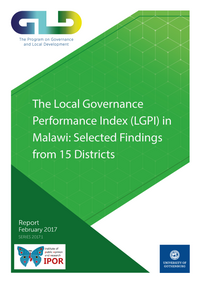GLD Reports
The GLD reports on this pages includes findings on topics such as access to education and health, political participation, gender and electability, citizen experiences of Covid-19, and more.
The Economics of Social Science in the Middle East and North Africa: Analysis of Funding for Social Science Research and Knowledge Production in the MENA Region
This study, prepared for the Research Ethics in the • Middle East and North Africa (REMENA) Special Commission on Social Science Research in the MENA, aims to provide an overview of funding for social science research on the MENA region. Based on a systematic review of calls for proposals and 924 grants and projects from 23 organizations, it provides insights into the relationship between funding and social science research on the MENA region and raises questions for future research.
Read the full report.
Supplementary Information to The Economics of Social Science in the Middle East and North Africa
This document includes information about data collection and initial coding and a description of data limitations.
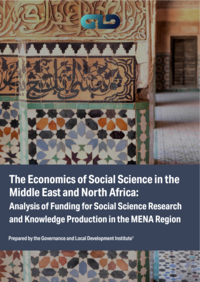
Report on Youth Survey: Gender and Electability in the Arab World
A survey on gender and electability in the Middle East and North Africa.
Countries: Algeria, Egypt, Jordan, Libya, Morocco, Tunisia.
Fielding Dates: August 19, 2022 to September 25, 2022.
Purpose: To explore youth's attitudes toward the electability, perceived traits, and competencies of female candidates.
Read the full report.
This report is also available in Arabic.
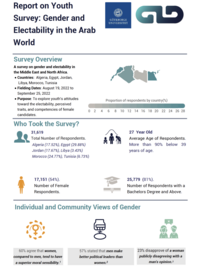
Fears, Vulnerabilities, and Precautions over COVID-19: A report on Citizen's Experiences in Malawi and Zambia
This report provides key findings on the local impact of Covid-19 in Malawi and Zambia. It is a result of the the GLD project, “Developing a Locally Rooted Approach to Covid-19 Response,” which started in March 2020. It aimed to explore how issues such as fear of infection, income loss, social stigma, trust in authorities, and access to information affect individuals’ daily lives during the pandemic.
Read the full report.
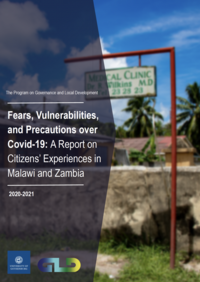
LGPI Report (2015)
The Local Governance Performance Index (LGPI) is a tool designed to measure and improve local governance. It helps countries collect and assess detailed information on local government performance and service delivery. Through clustered surveys, it uncovers local variations in governance, supporting policymakers in creating action plans, setting benchmarks for progress, and empowering citizens and businesses to influence government efforts to improve public services.
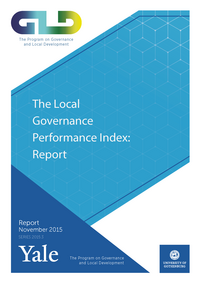
The Tunisian LGPI: Selected Findings on Health (2017)
Tunisia's health-care system is strong, covering 90% of the population through public and private insurance. However, it faces debt, quality gaps, and inequities. This report highlights successes, shortcomings, and areas for improvement to guide stakeholders in enhancing healthcare access and equity.
Read the full report.
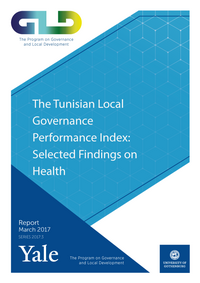
The Tunisian Local Governance Performance Index: Selected Findings on Education (2015)
Tunisia prioritizes education, with compulsory schooling for ages 6-16 established in the 2002 Education Act. However, international assessments like TIMSS and PISA reveal below-average performance. This report uses LGPI data to help citizens, educators, and policymakers improve education outcomes.
Read the full report here.
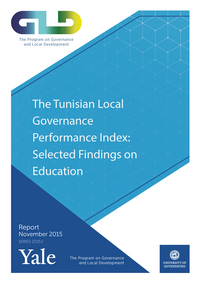
The Tunisian LGPI: Selected Findings on Gender (2016)
Tunisia has been a leader in advancing women's rights in the Arab world, starting with the 1956 Code of Personal Status, which abolished polygamy and gave women the right to initiate divorce. Over the years, women’s roles in the workforce and politics have grown. However, gender gaps and challenges in access to services remain in Tunisia, as they do throughout the world. This report examines gaps in political participation and in access to services in the arenas of security, health, and education.
Read the full report here.
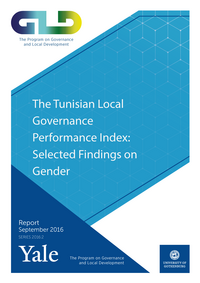
The Tunisian LGPI: Selected Findings on Political Participation (2016)
Political participation in Tunisia has gained importance after the 2011 Arab uprisings, as the country peacefully transitioned towards democracy. Following the 2011 Constituent Assembly election and the adoption of a new constitution in 2014, Tunisia held parliamentary and presidential elections, completing a four-year transition. This report explores various forms of political participation in post-revolutionary Tunisia, including voting, activism (e.g., protests and boycotts), and engagement with local leaders and non-state actors.
Read the full report here.
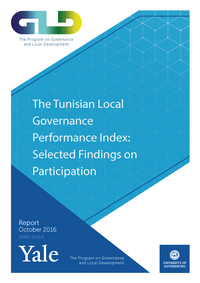
The LGPI in Malawi: Selected Findings on Gender (2017)
This report offers insights into gender disparities in health, education, security, and political participation in Malawi. It examines differences across regions, cultural groups, and socioeconomic statuses to support efforts toward women's empowerment.
Read the full report here.
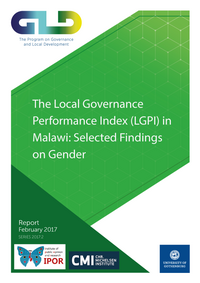
The LGPI in Malawi: Selected Findings on Livelihood (2016)
Daily life in Malawi is marked by challenges like reliance on subsistence farming, climate shocks, and limited social safety nets, trapping many in poverty. Despite this, Malawians have developed strong interpersonal coping. This report draws on data from the Local Government Process Indicators (LGPI) to highlight the challenges Malawians face on a daily basis, as well as the coping mechanisms people have developed to deal with those challenges.
Read the full report here.
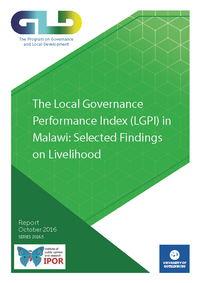
The LGPI in Malawi: Selected Findings on Land (2016)
Land is particularly important in Malawi. Eighty-four percent of the country’s population live in rural areas, and most of the rural population depends on agriculture for its livelihood. Yet, almost all agricultural activity takes place on only 21,200 square kilometers of arable land. Malawi is densely populated and land-dependent. It is not surprising, as this report show, that land is highly valued, a source of conflict, and politically important.
Read the full report here.
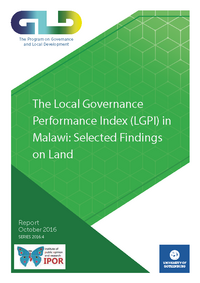
The LGPI in Malawi: Selected Findings on Education (2016)
Malawi has struggled to achieve universal primary education, with over 4.3 million children enrolled, but 11% of primary school-age children remain out of school. High dropout rates further hinder educational completion. This report uses data from the Local Governance Process Indicators (LGPI) to explore these challenges and local solutions for improving education.
Read the full report here.
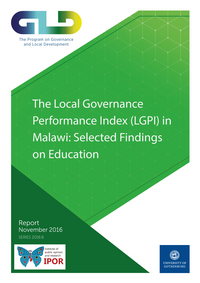
The LGPI in Malawi: Selected Findings on Health (2016)
Malawi, one of the world's poorest countries, has a high poverty rate and many health challenges. This report uses data from the Local Governance Process Indicators (LGPI) survey to examine the frequency of illnesses, access to healthcare, and service quality in Malawi. It also explores how factors like gender, education, and wealth affect health outcomes.
Read the full report here.
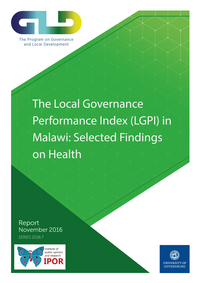
The LGPI in Malawi: Selected Findings from 15 Districts (2017)
This report uses data from the 2016 Local Governance Process Indicators (LGPI) survey in Malawi to analyze local governance and public sector performance. The LGPI helps assess service delivery, identify areas of need, and guide policy recommendations. The survey covered 15 districts across Malawi, focusing on key issues like livelihoods, health, land, and education.
Read the full report here.
